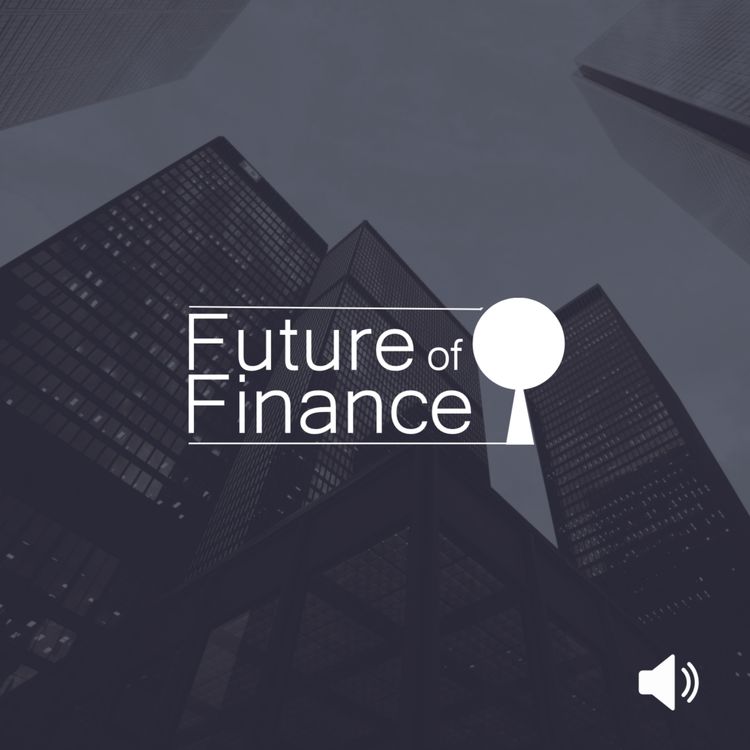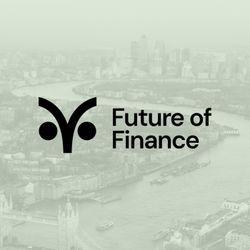Share

Where Finance Finds Its Future
SDX crypto-currency service is live
Season 1, Ep. 118
•
SDX, the digital arm of the Swiss stock exchange, has launched an income-generating crypto-currency staking service for clients of the private banks in Switzerland. Owned and operated by a separate entity within the group, the Cloud-based service enables holders of crypto-currencies to collect a yield on their portfolios by staking their assets to claim the rewards for validating or attesting blocks of transactions. Dominic Hobson, co-founder of Future of Finance, asked Alex Smith, Crypto Product Lead at SDX, what services SDX is providing for clients both now and in the future, how it is managing the recent volatility and the unavoidable risks and what adjacent opportunities it is exploring for the future.
More episodes
View all episodes

204. R3 Corda + Solana = Ethereum killer?
49:22||Season 1, Ep. 204Future of Finance Interviews Richard Brown, Chief Executive of R3 LabsThe pivot by R3 from private to public blockchains through its partnership with Solana might be one of those apparently arcane technical deals - like IBM and Microsoft or Apple and ARM - that changes everything. It allies regulated, institutional money with an open blockchain protocol that can compete with existing equity and debt marketplaces on volume, speed and price, while still delivering on the central promise of blockchain: elimination of high levels of financial intermediation. It could, by accelerating the tokenisation of traditional financial assets as well as traditional forms of money, achieve what Ethereum has so far failed to deliver. Future of Finance Co-founder Dominic Hobson asked Richard Brown, Chief Executive of R3 Labs, why the company has set such a radical new course.
203. It will take technology to humanise human resources
01:08:22||Season 1, Ep. 203Explore the paradox of using artificial intelligence (AI) to make better people decisions than managers can do on their own.What is the event about?Many corporations, especially in financial services, attribute much of their success to the quality of their talent, which might suggest that they would also credit the HR function with helping them to acquire, develop, motivate, and retain said talent. However, managers and employees instead often complain that HR is a large, growing and not particularly helpful function that creates policies and processes that interfere with corporations’ ability to effectively manage their talent. Whether justified or not, many managers fault HR for not adequately or appropriately leveraging technological advances for the benefit of both employees, managers, and shareholders. This event will explore how recent advances in AI can improve the efficiency and effectiveness of the HR function, reducing the resources it requires while also transforming the speed and quality of services it delivers.Who is on the panel?Todd Gershkowitz - Co-CEO at PaystandardsAnthony Poole - Partner, Human Capital at AONPavi Singh - Partner, UK & Ireland Leader HR and Talent Transformation Consulting at IBMEric Weinberg - VP Head of Executive and Equity Compensation at Prudential FinancialModerated by Dominic Hobson Co-Founder and Editorial Director at Future of Finance
202. GLEIF takes on the blockchain interoperability conundrum
38:32||Season 1, Ep. 202A Future of Finance interview with Alexandre Kech, CEO of GLEIF.There are two main obstacles to the scaling of the markets in digital assets and one of them is the lack of interoperability between blockchain networks and between blockchain networks and traditional financial markets. The default answer, hallowed by history in multiple industries, is standards. By enabling different networks to exchange data, they multiply the overall volume of counterparties and transactions. Unfortunately, attempts to achieve interoperability standards in digital assets suffer from limited usage and winner-takes-all proprietorial schemes, condemning most market participants to deploy risky or clumsy workarounds. So it is significant that the Global Legal Entity Identifier Foundation (GLEIF), set up by the Financial Stability Board in 2014 to overcome a major accelerant of the Great Financial Crisis of 2007 to 2009 – namely, the lack of a trusted counterparty identification standard on a global scale – has broadened its work to encompass digital assets. Dominic Hobson, co-founder of Future of Finance, spoke to Alex Kech, CEO of GLEIF.
201. Digital depositary receipts mark fresh advance for tokenised financial assets
33:59||Season 1, Ep. 201A Future of Finance interview with Thorsten Peisl, Founder and Chief Executive at KALYP Technologies. In 2026 Kalyp Technologies celebrates the tenth anniversary of its foundation as a provider of blockchain infrastructure to the regulated capital markets. It is an ambition that has required patience as well as more obvious resources, since securing the regulatory endorsement on which institutional engagement depends is a lengthy process. But now the company has built an open financial market infrastructure of its own, the Digital Securities Depositary Corporation (DSDC), and is embarked on its first major initiative - making American Depositary Receipts (ADRs) available as Digital Depositary Receipts (DDRs). Future of Finance co-founder Dominic Hobson spoke to Thorsten Peisl, Founder and Chief Executive of Kalyp Technologies.
200. Future of Finance and Tokenovate Half Day Event - Panel 4: How are regulators adapting to accommodate blockchain-based solutions in securities financing and collateral management?
12:25||Season 1, Ep. 200On June 04, 2025, Tokenovate and Future of Finance co-hosted a half-day event at the City of London Club, titled Exploring Blockchain’s Real Impact on Securities Finance, Collateral Management and the Repo Market. The event attracted more than 120 attendees from banks, asset management companies, market infrastructure, law firms, industry associations, Fin-Techs and consultants. This is an edited summary of the discussions that took place.Panellists: John Allan, Head of the Innovation and Operations Unit at the Investment Association; Romin Dabir, Partner, Financial Services and Regulation, Reed Smith; Anna Matson, EMEA Head of Digital Assets and Innovation, Northern Trust.To download the book for free, Click here.
199. Future of Finance and Tokenovate Half Day Event - Panel 3: How are public blockchains and smart contracts revolutionising financial processes?
10:21||Season 1, Ep. 199On June 04, 2025, Tokenovate and Future of Finance co-hosted a half-day event at the City of London Club, titled Exploring Blockchain’s Real Impact on Securities Finance, Collateral Management and the Repo Market. The event attracted more than 120 attendees from banks, asset management companies, market infrastructure, law firms, industry associations, Fin-Techs and consultants. This is an edited summary of the discussions that took place.Panellists: Ciarán McGonagle, Chief Legal and Product Officer at Tokenovate; Steve Whyman, European Commercial Head of Digital Asset Funds and Business at Apex.To download the book for free, Click here.
198. Future of Finance and Tokenovate Half Day Event - Panel 2: How can Tokenisation Unlock New Opportunities in Traditional Financing? What will the Future Look Like?
11:26||Season 1, Ep. 198On June 04, 2025, Tokenovate and Future of Finance co-hosted a half-day event at the City of London Club, titled Exploring Blockchain’s Real Impact on Securities Finance, Collateral Management and the Repo Market. The event attracted more than 120 attendees from banks, asset management companies, market infrastructure, law firms, industry associations, Fin-Techs and consultants. This is an edited summary of the discussions that took place.Panellists: Adrian Dale, Head of Regulation & Market Practice at the International Securities Lending Association (ISLA); Marcus van Abbé, Head of Digital Market Infrastructure at R3; Steve Whyman, European Commercial Head of Digital Asset Funds and Business at Apex; Roy Zimmerhansl, Partner and Head of Capital Markets, WTS Hansuke.To download the book for free, Click here.
197. Future of Finance and Tokenovate Half Day Event - Panel 1: How is blockchain reshaping liquidity and collateral flows in securities lending and repo?
11:57||Season 1, Ep. 197On June 04, 2025, Tokenovate and Future of Finance co-hosted a half-day event at the City of London Club, titled Exploring Blockchain’s Real Impact on Securities Finance, Collateral Management and the Repo Market. The event attracted more than 120 attendees from banks, asset management companies, market infrastructure, law firms, industry associations, Fin-Techs and consultants. This is an edited summary of the discussions that took place.Panellists: Doug Bambrick, Head of the UK Custody Product for the UK and Middle East, BNP Paribas Securities Services; Basu Choudhury, Head of Partnerships and Alliances, OSTTRA; Yalini Isweran, Executive Director, Product Management at DTCC Digital Assets; Martin O’Connell, Solutions Architect, HQLAx.To download the book for free, Click here.
196. Digital Asset Exchange 2025 - Panel 5: What is the future of exchanges?
23:45||Season 1, Ep. 196On 13 March 2025 Future of Finance hosted a one-day event at the offices of ReedSmith in London. Entitled Digital asset exchanges: Will tokenisation be the nemesis of exchanges or the re-making of them?, the event attracted more than 200 registrants from stock exchanges, trading venues, digital asset exchanges, fund administrators, central securities depositories, central counterparty clearing houses, technology vendors, data vendors, consultants, custodians, asset managers, wealth managers, banks, brokers, insurers, payments service providers, law firms, venture capital funds, cryptocurrency firms, blockchain platforms and academia. This is an account of what they and the panellists contributed to the five sessions that day, both live and in the multiple-choice questionnaire they completed in advance, the results of which are also published here.Panellists: Martin Watkins, CEO of Montis Group; Michele Curtoni, Head of Strategy at SIX Digital Exchange; Max Heinzle, founder and CEO of 21X; Vic Arulchandran, Director, Deutsche Börse | Clearstream and Head of Digital Product and Market Design; and Yalini Isweran, Head of the Digital Launchpad at the Depository Trust & Clearing Corporation (DTCC).